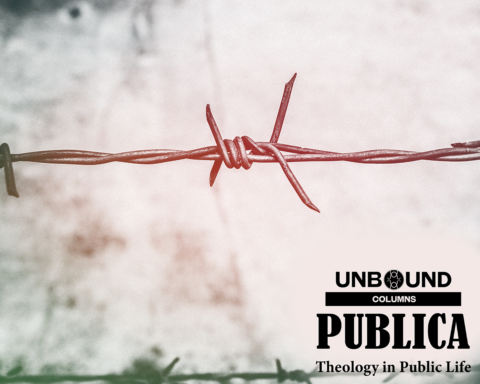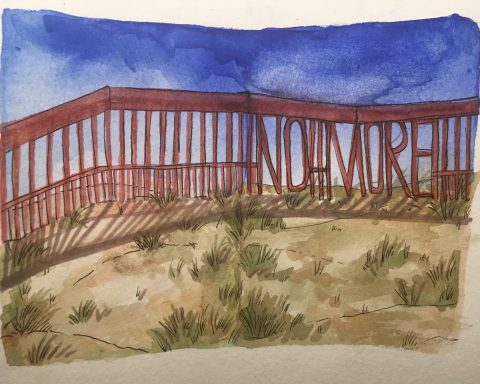Seeking Honesty at Thanksgiving

PC: Ilana Urman
For many Americans, the word “Thanksgiving” brings warm feelings of family, of food, and of altogether unqualified enjoyment. It is a time when it seems we can put the worries of the world on the shelf, simply celebrating life, love, and community.
Growing up, we are fed an accompanying spin on history, a narrative which seems to reinforce this spirit: that the “First Thanksgiving” was celebrated by colonists who were “welcomed happily” by their Native American friends. While there is at least one written account suggesting that about 90 Wampanoag Native Americans indeed celebrated a bountiful harvest with the Puritan settlers in 1621 (after signing a treaty of alliance against a rival tribe) the real context of the events—including the date—is disputed.
___________________________________________
We live in a nation which last year forcibly desecrated more of the little remaining Native American land with an oil pipeline—resulting this year in the very kind of oil spill which the First Nations had feared! How can such a nation justify celebrating a friendship which it has repeatedly forsaken?
___________________________________________
Here’s the thing, though: assume, for the moment, that the First Thanksgiving in 1621 occurred exactly as we are taught. Even then, teaching this story out of context—emphasizing only the snapshot of peace, and not the following disease, war, and slavery that ultimately decimated Native Americans of all tribes and cultures—would be profoundly dishonest.
We live in a nation which last year forcibly desecrated[1] more of the little remaining Native American land with an oil pipeline—resulting this year in the very kind of oil spill which the First Nations had feared! How can such a nation justify celebrating a friendship which it has repeatedly forsaken?
This hypocrisy is only reinforced by the way that we have often turned around and been decidedly un-Christ-like in our welcome for the new immigrants who today follow in our ancestors’ footsteps.
___________________________________________
It is remarkable how tradition and joint conviction can traverse barriers like language.
___________________________________________
I recently attended a worship service led by Elmer Zavala, pastor of the “South Louisville/Preston Highway Ministry with Hispanics/Latinos, a PC(USA) ministry. I could only understand bits and pieces of the songs and prayers, which were all in Spanish. On the other hand, some of the music was set to tunes that I recognized. It is remarkable how tradition and joint conviction can traverse barriers like language.
By the time we got to the Scripture reading, I was ready to take my turn—along with the children—at sounding out the text in Spanish, one line at a time. We would learn together! The reading was from Matthew:
“For the kingdom of heaven is like a landowner who went out early in the morning to hire laborers for his vineyard. 2After agreeing with the laborers for the usual daily wage, he sent them into his vineyard. 3When he went out about nine o’clock, he saw others standing idle in the marketplace; 4and he said to them, ‘You also go into the vineyard, and I will pay you whatever is right.’ So they went. 5When he went out again about noon and about three o’clock, he did the same. 6And about five o’clock he went out and found others standing around; and he said to them, ‘Why are you standing here idle all day?’ 7They said to him, ‘Because no one has hired us.’ He said to them, ‘You also go into the vineyard. 8When evening came, the owner of the vineyard said to his manager, ‘Call the laborers and give them their pay, beginning with the last and then going to the first.’ 9When those hired about five o’clock came, each of them received the usual daily wage.10Now when the first came, they thought they would receive more; but each of them also received the usual daily wage. 11And when they received it, they grumbled against the landowner, 12saying, ‘These last worked only one hour, and you have made them equal to us who have borne the burden of the day and the scorching heat.’ 13But he replied to one of them, ‘Friend, I am doing you no wrong; did you not agree with me for the usual daily wage? 14Take what belongs to you and go; I choose to give to this last the same as I give to you. 15Am I not allowed to do what I choose with what belongs to me? Or are you envious because I am generous?’ 16So the last will be first, and the first will be last.”
—Matthew 20: 1-16, NRSV
___________________________________________
Following my instinct, it would have been a simple, heartwarming sermon—but Elmer surprised me, just as Jesus so often does, by complicating the narrative.
___________________________________________
Elmer’s sermon—live-translated for me by his wife Ellen Sherby, who leads the music and is a colleague on the national staff for PC(USA)—re-told the scripture in the terms of a modern-day hourly worker, like perhaps a welder or a warehouse worker…an easy interpretation to imagine, since any good preacher will keep the audience in mind.
It was equally easy to imagine, I thought, where my new immigrant friends would fit into Elmer’s story: having come to the United States through many trials, with few resources and a scant support network, they would be “the last” whom Jesus says will become first!
Following my instinct, it would have been a simple, heartwarming sermon—but Elmer surprised me, just as Jesus so often does, by complicating the narrative. He told the story from the perspective of the worker who works from the early morning to the late night, and is paid the same as one who works a shorter day…and his repeated mantra, paraphrased, was not “your patience will pay off!” but “be careful what you complain about!” What makes any of us, Elmer argued, think that we are entitled to more than another whom God treats with mercy?
After the service, our hosts served a simply delicious meal—eager to share hospitality, even to strangers. It seemed to me a far more honest “Thanksgiving” which they were holding than any narrative about European welcome in North America. When immigrants give thanks today, they are eager to share. And so I thought about the triple irony of those north-moving immigrants—perhaps even partly related to the Native peoples of this continent—hosting this descendent of early European immigrants (traced back to Gregory Stone in 1635)—when some nativist US citizens wish to welcome no one further to “our” country.
___________________________________________
Heaven on earth could be when we sing out loud the words of Emma Lazarus: “Give me your tired, your poor, your huddled masses yearning to breathe free!” and welcome all peoples to the Table.
___________________________________________
I came away from the meal, and from Elmer’s sermon, with a new interpretation of Jesus’ words about “the first” and “the last”. I was reminded to think about the story, not as a positive description of what Heaven will be, but rather as a normative description of how the meaning of Heaven must inform our actions.
Perhaps “Heaven” is not just some moment in the future at which the poor are vindicated and given great power and prestige for all time. Heaven on earth could be when we see to it in the United States that another person gets enough, and we don’t have the willful pride to feel cheated for it. Heaven on earth could be when we sing out loud the words of Emma Lazarus: “Give me your tired, your poor, your huddled masses yearning to breathe free!” and welcome all peoples to the Table.
Perhaps then, living out a life of Giving rather than fearful hoarding, we will have the confidence needed to truly own up to the honest, uncomfortable history of colonialism which hides behind too much of today’s holiday of Thanksgiving.
***
AUTHOR BIO: Henry Koenig Stone serves in Louisville, KY as current Managing Editor of Unbound and Associate for Young Adult Social Witness. Originally from Rochester, NY, Henry comes from a long line of pastors and professors. His family has practiced an equally long critical tradition of having “roast preacher” for Sunday lunch. Henry holds a B.A. in Economics (2015) from the University of Chicago and an MPP (2017) from UChicago’s Harris School of Public Policy. His past work has focused on policy analyses of healthcare pilot programs and public health systems. A baritone, Henry is a fan of both sacred and irreverent vocal traditions. His favorite place on earth is Dunkirk Camp & Conference Center, where he has been a summer camp counselor for many years.
[1]I here re-post (from an earlier Unbound article, written by Benjamin Perry) a video taken at Standing Rock as part of the peaceful protest against the desecration of Native American land:






Unbound Social